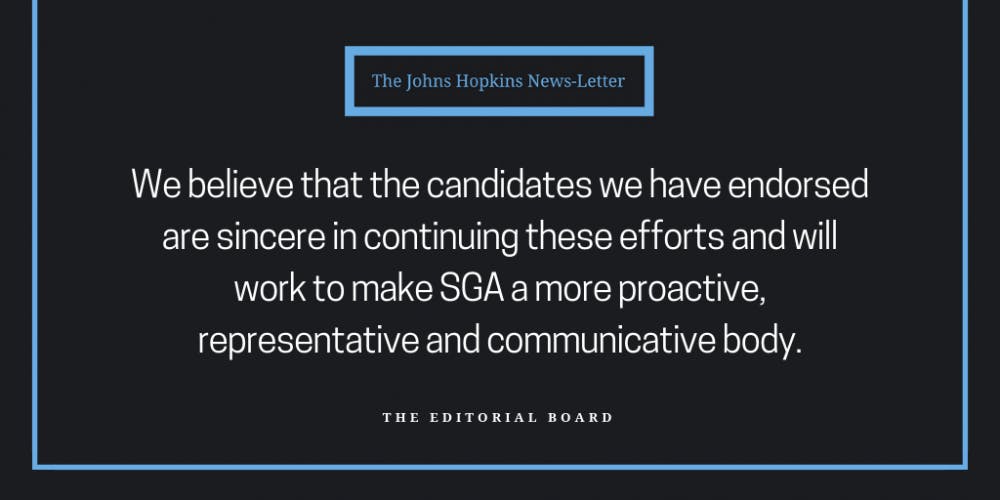This past year, the Student Government Association (SGA) has had both triumphs and tribulations. SGA members have campaigned for years for a student center, and this month they realized that goal when the University announced that one will be built by 2024. SGA also hosted its inaugural Mental Health Summit to address the lack of mental health resources on campus. Beginning in the fall, around 2,000 undergraduates responded to an SGA-led referendum on campus issues. These are some of SGA’s successes from the past year.
Yet amid these accomplishments, SGA has continued to face challenges engaging the student body and managing its internal operations. In an email to the junior class, the SGA Junior Class Council revealed that the word that students most commonly associated with SGA is “useless.” Moreover, the impeachment trial of former Executive President Noh Mebrahtu in February, which was held during a closed session, brings SGA’s transparency into question.
We’ve argued that SGA has been most effective when its members focus on concrete, realistic initiatives. SGA members are also aware of some of the most pressing issues on campus: sexual assault, mental health, private police and disability services to name a few. But we also know that SGA is in need of reform. It is still working to strengthen its ties with the student body and to better advocate for student voices.
Upon interviewing the two tickets for SGA’s Executive Election — “Hop Forward” and “Change” — as well as an independent candidate, the Editorial Board endorses the following candidates for SGA’s Executive Board: Aspen Williams for Executive President, Claire Gorman for Vice President, Nathan Mudrak for Executive Treasurer and Pritika Parmar for Executive Secretary.
PRESIDENT: ASPEN WILLIAMS
Both candidates running for the position of executive president bring refreshing passion and a commitment to representing the diverse concerns of Hopkins students. That being said, the Editorial Board endorses Aspen Williams because of her previous experience, her commitment to improving SGA’s efficacy and her long-term plans to expand SGA’s outreach among students and within the administration.
Williams, a former freshman senator and this year’s executive secretary, has already taken concrete steps to build stronger relationships with the administration while advocating for students. As part of this year’s executive board, Williams worked on the Powers and Authorities Resolution, which seeks to add student representation to the Board of Trustees, the Homewood Academic Council and other bodies which affect long-term decisions at the University. She has personally met with individual Trustees and other high-level members of the administration to discuss the issues students care about. Those connections will help Williams work on long-term projects, despite the fact that her position is limited to just a year.
In her interview with the Editorial Board, Williams emphasized her commitment to institutional memory and sustained advocacy. Because students graduate from Hopkins after four years, many projects that SGA has pursued have lost momentum as each class of students has graduated out. By committing to institutional memory and sustained advocacy, Williams believes that she and her ticket will be able to start working on long-term initiatives that will benefit future students, not just those currently enrolled.
Additionally, Williams outlined clear plans to streamline the process of recognizing and funding student groups. We hope that with less bureaucracy and red tape, those groups will better be able to focus on engaging students, partnering with SGA to host events and advocating for other initiatives on campus. Williams has also demonstrated a commitment to building connections between student groups — SGA has worked to support a coalition of organizations working on environmental advocacy at Hopkins, and last fall hosted an inaugural activism fair to bring together groups engaged in social and political advocacy. We believe Williams can use SGA’s platform and resources to continue to strengthen partnerships between these groups.
Williams has also been proactive in trying to make SGA a more diverse, welcoming and supportive community. She has helped spearhead initiatives like the Pink Wave and Rainbow Wave in order to encourage female and LGBTQ candidates to run for office.
Jessup Jong, in his second bid for executive president, demonstrates an earnest effort to engage with students and to ensure that he advocates proportionately for the issues that are most important on campus. He also offers a new perspective on SGA’s processes as a self-described outsider.
We commend many of Jong’s positions. Jong acknowledged common concerns about the private police force — arming officers on campus, possible racial profiling, and the University’s seeming insistence on ignoring criticisms from students and community members. He also criticized the administration for announcing the creation of a student center without devising a specific plan for re-allocating the resources in Mattin Center. We share such concerns.
However, Jong lacks a thorough understanding of SGA’s role on campus and failed to explain how he would address student concerns. His more ambitious plans, such as diverting some of the proposed student center funding toward addressing mental health and sexual assault resources, are too broad and fall outside of the scope of SGA’s power. One of Jong’s more alarming proposals is to promote involvement in Greek life as a solution to sexual assault and mental health problems. He believes that the current relationship between the University and Greek life is antagonistic, and that the administration should work more closely with fraternities and sororities to regulate their activities. We do not believe that this is an effective approach to addressing mental health and sexual assault on campus.
Additionally, we were perturbed by Jong’s unprofessional conduct during our interview process: It was difficult to set up a time to interview Jong and his running mates because they were slow to respond to our requests. Jong and Ahmed Elzokm, another member of his ticket, were also substantially late to our interview and it was clear there was little communication between them beforehand.
VICE PRESIDENT: CLAIRE GORMAN
When the Editorial Board spoke with Gorman, she described specific policies she would work to implement if elected. These include holding an active listening workshop for SGA members as well as implementing a mentorship program to help familiarize new members with procedures like writing a bill.
Gorman believes that conversations between SGA members during meetings are often disjointed and repetitive. She plans to streamline parliamentary procedure so that meetings flow more efficiently. As a member of A Place To Talk (APTT), Gorman also plans to cultivate a culture of empathy and kindness within SGA to ensure everyone feels that their voices are heard. We are confident that she possesses the skills necessary to implement these changes while still adhering to parliamentary procedure.
Among the other parts of her platform, Gorman seeks to advocate for women and marginalized students, mental wellness, arts groups and Student Disability Services. She outlined specific and achievable initiatives SGA could spearhead to benefit students. For example, she hopes to create and share a public calendar of student performances with the student body, as well as to schedule coffee chats with groups on campus. She has worked with Williams on the Pink Wave and Rainbow Wave initiatives and wants SGA to focus on passing smaller initiatives that are easier to implement and will have a tangible positive impact on the student body.
Dean Chien, Hop Forward’s candidate for vice president, would bring valuable experience to the position. Chien has served for three years in SGA, is the current junior class president, and has worked on long-term projects such as implementing a black caucus, the push for a student center and adding an APTT room in Brody. He has also promoted transparency and honesty between SGA and the student body through regular email blasts to the junior class. While Chien’s work is commendable, we believe the SGA executive board could benefit from Gorman’s fresh perspective and ideas that are specific to the Senate and addressing the culture of SGA.
We believe that as a newer member, Gorman will be able to think more critically about SGA’s procedures and be more willing to change long-standing policies and practices. Her strengths lie in communication and forming connections with students, which are critical skills for the role of executive vice president.
SECRETARY: PRITIKA PARMAR
During our interview with Parmar, she expressed a keen interest in engaging more directly with the student body through regular emails and more intentional use of social media. She has already undertaken such efforts, helping the Freshman Class Council increase its presence on Instagram and other platforms.
Parmar is a freshman and only has one year of experience in SGA as a class senator. However, she has already formed close connections with many in the University’s administration. She has also made great strides in shaping culture on campus: Parmar is currently working with several other SGA members on a proposition to allow free printing for students. Although the bill is not complete, her passion is apparent and she has several logical solutions to bring printing costs down.
Junior Ahmed Elzokm conveyed several new ideas in his interview with the Editorial Board, including better pest control in the freshman dorms. However, he admitted that he did not know enough about financing within SGA to have a firm plan to accomplish this. He also suggested that SGA should streamline communication with the student body but did not provide concrete plans as to how he would make this a reality.
TREASURER: NATHAN MUDRAK
Mudrak has served on SGA for the past year as a senator and co-chair of the Civic Engagement Committee. In our interview, he explained that he worked with current Executive Treasurer Mi Tu to ensure that student groups are adequately funded. We admire Mudrak’s commitment to helping guide student organizations through the re-registration process and ensuring that they have access to their finances.
The commitment to managing student finances and advocating on behalf of student organizations is exactly what we need in an executive treasurer. It is imperative that students be informed about their organization’s budgets and we think that students could benefit from having Mudrak act as their liaison to administrators. We are also confident that Mudrak will be able to handle the responsibilities of being Chair of the Student Activities Commission (SAC), which is in charge of issuing grants to student groups.
Freshman Eric Armstrong is also running for the executive treasurer position, and we commend his commitment to being transparent with the student body and ensuring that students know about SGA’s financial resources. However, Armstrong didn’t explain how he would use the role of treasurer to help address some of his key issues: inadequate mental health resources, lack of school spirit and communication between students and administrators.
In the past, the Editorial Board has expressed its concern over some of SGA’s limitations and shortcomings: its lack of influence over University decisions, its inefficacy in galvanizing students into political action and a culture that needs to be more diverse and inclusive. We are aware of student concerns that SGA is “useless” and lacks transparency. Yet we’ve also seen what its members are capable of, whether it’s realizing long-term initiatives like the student center or making mental health resources more accessible for students and being a voice for the student body. We believe that the candidates we have endorsed are sincere in continuing these efforts and will work to make SGA a more proactive, representative and communicative body.





